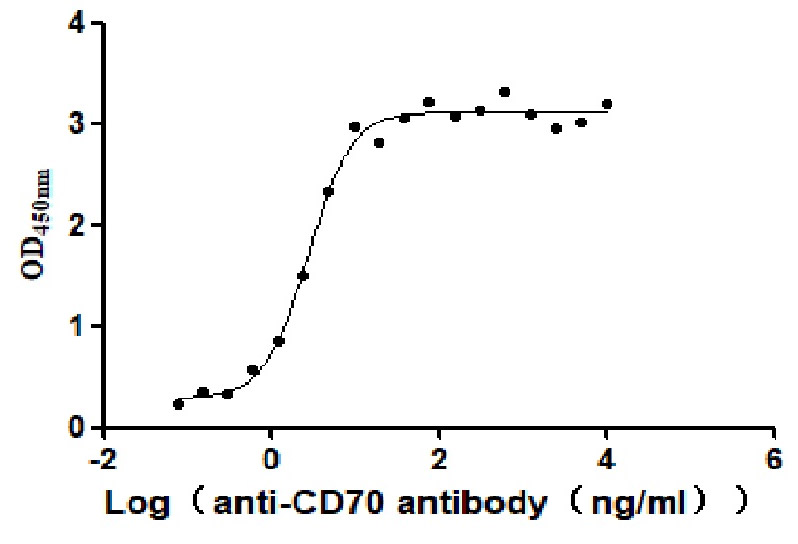Recombinant Mouse Protein-tyrosine sulfotransferase 1 (Tpst1)
-
中文名稱:小鼠Tpst1重組蛋白
-
貨號:CSB-CF024132MO
-
規(guī)格:
-
來源:in vitro E.coli expression system
-
其他:
產(chǎn)品詳情
-
基因名:Tpst1
-
Uniprot No.:
-
別名:Tpst1; Protein-tyrosine sulfotransferase 1; Tyrosylprotein sulfotransferase 1; TPST-1
-
種屬:Mus musculus (Mouse)
-
蛋白長度:full length protein
-
表達區(qū)域:1-370
-
氨基酸序列MVGKLKQNLLLACLVISSVTVFYLGQHAMECHHRIEERSQPARLENPKATVRAGLDIKANKTFTYHKDMPLIFIGGVPRSGTTLMRAMLDAHPDIRCGEETRVIPRILALKQMWSRSSKEKIRLDEAGVTDEVLDSAMQAFLLEVIVKHGEPAPYLCNKDPFALKSLTYLARLFPNAKFLLMVRDGRASVHSMISRKVTIAGFDLNSYRDCLTKWNRAIETMYNQCMEVGYKKCMLVHYEQLVLHPERWMRTLLKFLHIPWNHSVLHHEEMIGKAGGVSLSKVERSTDQVIKPVNVGALSKWVGKIPPDVLQDMAVIAPMLAKLGYDPYANPPNYGKPDPKILENTRRVYKGEFQLPDFLKEKPQTEQVE
Note: The complete sequence including tag sequence, target protein sequence and linker sequence could be provided upon request. -
蛋白標簽:N-terminal 10xHis-tagged
-
產(chǎn)品提供形式:Liquid or Lyophilized powder
Note: We will preferentially ship the format that we have in stock, however, if you have any special requirement for the format, please remark your requirement when placing the order, we will prepare according to your demand. -
Lyophilized from Tris/PBS-based buffer, 6% Trehalose, pH 8.0
-
儲存條件:Store at -20°C/-80°C upon receipt, aliquoting is necessary for mutiple use. Avoid repeated freeze-thaw cycles.
-
保質(zhì)期:The shelf life is related to many factors, storage state, buffer ingredients, storage temperature and the stability of the protein itself.
Generally, the shelf life of liquid form is 6 months at -20°C/-80°C. The shelf life of lyophilized form is 12 months at -20°C/-80°C. -
貨期:Basically, we can dispatch the products out in 1-3 working days after receiving your orders. Delivery time may differ from different purchasing way or location, please kindly consult your local distributors for specific delivery time.Note: All of our proteins are default shipped with normal blue ice packs, if you request to ship with dry ice, please communicate with us in advance and extra fees will be charged.
-
注意事項:Repeated freezing and thawing is not recommended. Store working aliquots at 4°C for up to one week.
-
Datasheet & COA:Please contact us to get it.
相關產(chǎn)品
靶點詳情
-
功能:Catalyzes the O-sulfation of tyrosine residues within acidic motifs of polypeptides, using 3'-phosphoadenylyl sulfate (PAPS) as cosubstrate.
-
基因功能參考文獻:
- Results demonstrate the importance of protein-tyrosine sulfation for proper development of the retina and suggest different phenotypes resulting from elimination of TPST-1 or -2 may reflect differential expression patterns or levels of the enzymes. PMID: 22745813
- two genes identified in this analysis, PLEC1 and TPST1, reduced IL-6 production by macrophages PMID: 21665277
- These results indicate that protein-tyrosine sulfation by Tpst1/2 is essential for proper outer segment morphogenesis and synaptic function, but is not critical for overall retinal structure or synapse formation. PMID: 21039965
- Tpst1 and Tpst2 are the only Tpst genes in mice, tyrosine sulfation is required for normal pulmonary function at birth, and TPST-2 is required for normal thyroid gland function. PMID: 18243191
-
亞細胞定位:Golgi apparatus membrane; Single-pass type II membrane protein.
-
蛋白家族:Protein sulfotransferase family
-
組織特異性:Ubiquitous. Detected in heart, brain, lung, liver, spleen, kidney, skeletal muscle and testis.
-
數(shù)據(jù)庫鏈接:
Most popular with customers
-
Recombinant Human Cannabinoid receptor 1 (CNR1)-VLPs (Active)
Express system: Mammalian cell
Species: Homo sapiens (Human)
-
Recombinant Human Complement component C1q receptor (CD93), partial (Active)
Express system: Mammalian cell
Species: Homo sapiens (Human)
-
Recombinant Human Interleukin-17A (IL17A) (T26A) (Active)
Express system: Baculovirus
Species: Homo sapiens (Human)
-
Recombinant Macaca fascicularis zymogen granule protein 16 homolog B (ZG16B) (Active)
Express system: Mammalian cell
Species: Macaca fascicularis (Crab-eating macaque) (Cynomolgus monkey)
-
Recombinant Human CD70 antigen (CD70), partial (Active)
Express system: Mammalian cell
Species: Homo sapiens (Human)
-




-AC1.jpg)













